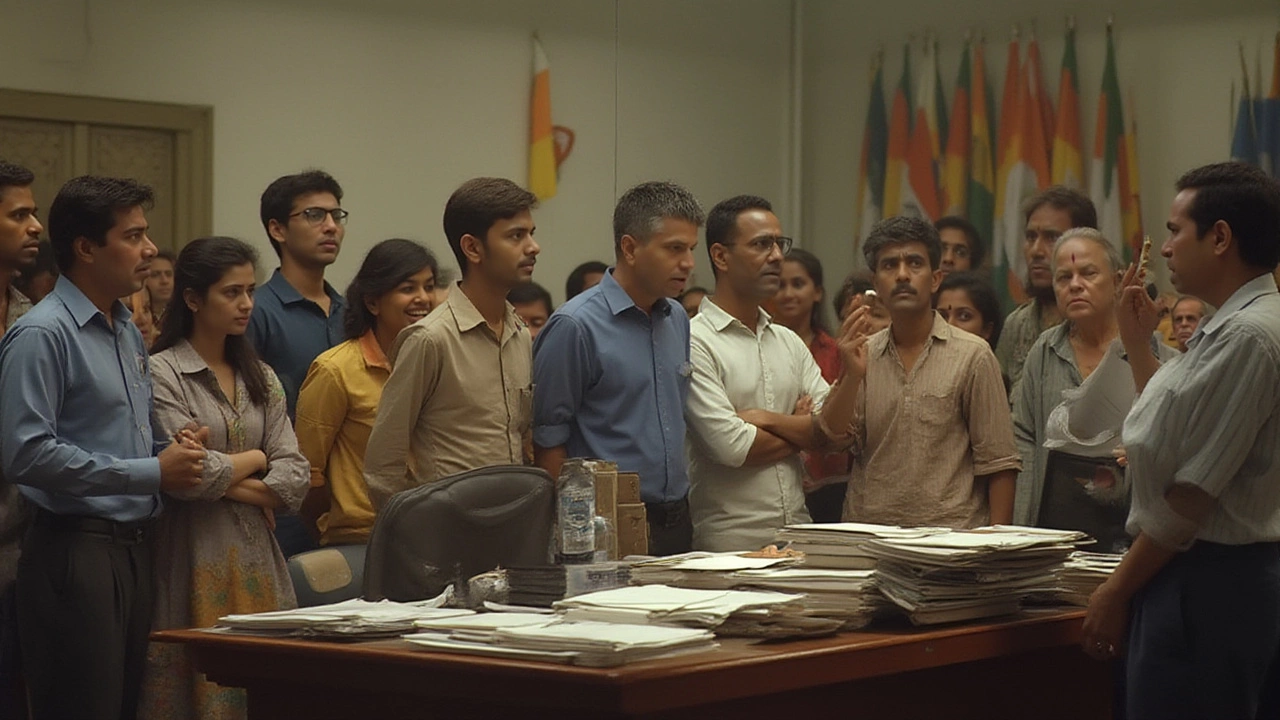
Picture nailing every exam and acing the interview, only to get a denial letter for a federal job. Brutal, right? That feeling—when you scan the email over and over searching for a clue—is more common than you’d think. Federal gigs are some of the steadiest out there, so the competition is fierce. But here’s the real kicker: sometimes it’s not about your skills or education, but about invisible rules and tiny details. This is where people get tripped up, often by stuff they never saw coming. Ready for the real reasons people get stopped cold? Let’s dig deep.
Background Checks: The Silent Gatekeeper
One of the top reasons applicants get the axe is the background check. We’re not talking about a quick Google search. When you apply for a federal job, especially anything touching on security or sensitive data, they run a federal background investigation. It covers criminal records, credit history, and sometimes even talks with your old neighbors. Here’s an eye-popping fact: according to the U.S. Office of Personnel Management, about 15% of federal job candidates get disqualified at this stage each year.
Let’s break that down. Any felony conviction, pending legal charges, or even some misdemeanors pop up instantly. You think an old DUI won’t matter? For positions tied to law enforcement or national security, even a distant brush with the law can ruin your chances. Even non-criminal stuff, like a history of financial irresponsibility, can signal to the government that you might be vulnerable to bribery or blackmail.
But it gets weirder. Sometimes, it’s not what’s in your file—it’s what isn’t. Missing or inconsistent information (like an unexplained job gap or address switch) can send up red flags. Investigators can interpret these gaps as signs you’re hiding something. Plus, with social media checks in some agencies, that edgy post from college could come back to haunt you. Tip: comb through your digital footprint, and don’t fudge anything on your application. Even small fibs can turn into deal-breakers later.
Citizenship, Residency, and Selective Service: The Basics You Can’t Fake
You’d think being a U.S. citizen is a no-brainer for government jobs. But it’s surprisingly a stumbling block for people. According to the U.S. Office of Personnel Management, over 85% of federal jobs require you to be a U.S. citizen. For non-citizens, the options are super limited—mainly with agencies like the Library of Congress or as certain researchers. Permanent residents almost always get shut down except for a few rare internships or contracts.
Residency can be another silent killer. Some defense and intelligence jobs demand background checks that span at least the past seven years in the U.S. Living or working overseas during that time can slow—or even halt—your application, since they have a hard time vetting foreign activities and contacts.
Men face one more tripwire: Selective Service registration. If you're a guy between 18 and 25 and didn't register (unless you qualify for an exemption), kiss that job goodbye. No explanations save you—no "I forgot," or "it was an oversight." The requirement is federal law, and it’s one of the first things they check.

The Paper Trap: Applications, Tests, and Interviews
This is where dreams die by paperwork. Missing information, unchecked boxes, and bad formatting are instant death sentences. USAJobs.gov, the main federal jobs portal, says that nearly 60% of applications get tossed out before ever reaching human eyes, just because people miss a step in the process.
The feds love details. They want exact dates, full addresses, supervisor contacts, and a breakdown of duties. Even a typo in your Social Security number can lock you out of the running. People also sabotage themselves with vague resumes—just listing “manager” without specifics isn’t enough. The government uses a point system, and a generic answer can tank your score.
But it’s not just paperwork. Some jobs require you to pass a written exam or an online assessment. Blow the test, and you’re out. Interviews can be tricky, too. If you struggle to answer questions about integrity or following rules, that’s a problem. They want people who play by the book, not cowboys who cut corners. Remember, even a poorly organized email or missed deadline sends a message about reliability.
Drugs, Debt, and Digital Dirt: The Undercover Disqualifiers
When you think government gig, you might not picture a drug test, but it's standard. Even weed is a red flag: federal law still classifies cannabis as illegal, so recent use—no matter what your state allows—can freeze your application. Security clearances make things stricter; there, even admitted past use (with or without a criminal record) can trigger problems. According to a Department of Defense report, roughly 22% of security clearance denials in the last three years were tied directly to drug use or related conduct.
Next up: money. Think the feds won’t care if you have credit card debt? Actually, they do. Big debts, lots of late payments, or a record of bankruptcy can mark you as a "security risk," since you might be desperate for cash or vulnerable to blackmail. This is especially true for jobs that need security clearances. Fixing your credit report ahead of time helps more than you’d imagine, not just for job hunts but for life in general.
And don’t underestimate digital dirt. Posts, tweets, or old forum rants that look like bigotry, threats, or criminal talk can explode your chances. Agencies increasingly use social media scans to hunt for troubling behavior. Also, lying to cover past mistakes—like leaving out a criminal charge or saying you never used drugs—sinks more applicants than the past mistakes themselves. Honesty counts here, sometimes more than a perfect record.

Other Roadblocks: Medical Issues, Nepotism, and Policy Pitfalls
Medical conditions aren’t supposed to discriminate, but for specific jobs—especially law enforcement or those needing security clearances—there are strict physical and mental health standards. For example, the FBI disqualifies candidates for jobs requiring firearms if they have certain eye conditions, recurring depression, or unmanaged chronic illnesses. The same applies for jobs demanding lots of physical activity or firearm carrying. Agencies can require thorough health screenings, and not passing them means a fast rejection.
Nepotism, or the appearance of it, causes more trouble than people guess. If you’re closely related to someone high up in the agency, it could hurt your chances. There’s no leeway here: automatic rejection in some cases, or they’ll move you to less sensitive roles just to avoid questions about favoritism. In some agencies, evidence that you’ve pulled strings to get in can get you blacklisted from future opportunities too.
Finally, agency-specific rules trip folks up. Every department has its own deal-breakers. Customs and Border Protection has zero tolerance for past domestic violence convictions. The Postal Service disqualifies applicants for unsatisfactory prior employment records—a major issue for people who left old jobs on bad terms. Don’t forget contract rules, either: some jobs ban anyone who’s worked overseas for certain foreign governments, or even spent significant time living in particular countries. Always check the fine print specific to the agency you’re applying to.
| Reason for Federal Job Disqualification | Percent of Cases (Annual Average) |
|---|---|
| Failed Background Check | 15% |
| Application Errors or Incomplete Submission | 60% |
| Drug Use/Testing or Digital Misconduct | 22% |
| Citizenship/Residency Issues | 3% |
| Other (Medical, Nepotism, Policy) | ~5% |
Getting a federal job feels like navigating a minefield sometimes. It’s not just about being qualified; it’s about proving you have the right history, paperwork, behaviors, and sometimes even relatives. The best way through? federal jobs are won by candidates who know the rules and play it airtight—no shortcuts, no secrets, no hoping that small details slide by. Stay smart, dig through the checklists, fix your digital history, and double-check every box. Trust me, missing a tiny step is a lot more common than missing a skill. And that's what really stops people from landing that federal career.
More Articles

Hardest MBA Classes: What Makes Them Challenging?
Curious about the hardest MBA class? Discover which discipline gives students the most trouble, why, and how to conquer it with proven tips and insights.

Best Coding Classes: How to Choose the Right One for You
Not all coding classes are made equal, and picking the right one can change how fast (and how well) you learn to code. This article breaks down the most popular coding classes out there, from beginner-friendly options to more in-depth, hands-on courses. We'll dig into what makes each option stand out, share tips for picking a class that fits your goals, and bust a couple of myths about what's actually 'best' for different learners. Whether you want to switch careers, build apps, or just level up your tech skills, you'll find real advice here. Get ready to figure out which class will move you forward fastest.

CBSE Students Count in India: Beyond the Numbers
The CBSE board in India registers some of the highest numbers of students across the country. It provides a flexible and diverse curriculum that is favored by many for its structured approach. We'll explore how many students are actually enrolled under the CBSE board and what this indicates about education trends in India. Insightful facts and tips on navigating the CBSE system can help students and parents understand the board's influence and offerings. Whether you're looking into schools or just curious, this article sheds light on the numbers and beyond.
